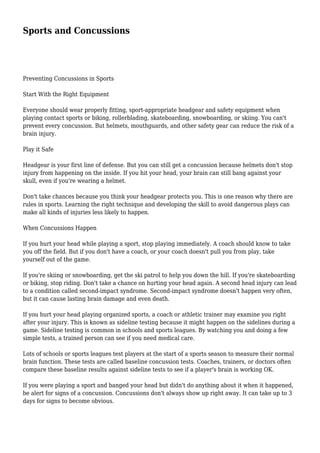
Sports and Concussions
- 1. Sports and Concussions Preventing Concussions in Sports Start With the Right Equipment Everyone should wear properly fitting, sport-appropriate headgear and safety equipment when playing contact sports or biking, rollerblading, skateboarding, snowboarding, or skiing. You can't prevent every concussion. But helmets, mouthguards, and other safety gear can reduce the risk of a brain injury. Play it Safe Headgear is your first line of defense. But you can still get a concussion because helmets don't stop injury from happening on the inside. If you hit your head, your brain can still bang against your skull, even if you're wearing a helmet. Don't take chances because you think your headgear protects you. This is one reason why there are rules in sports. Learning the right technique and developing the skill to avoid dangerous plays can make all kinds of injuries less likely to happen. When Concussions Happen If you hurt your head while playing a sport, stop playing immediately. A coach should know to take you off the field. But if you don't have a coach, or your coach doesn't pull you from play, take yourself out of the game. If you're skiing or snowboarding, get the ski patrol to help you down the hill. If you're skateboarding or biking, stop riding. Don't take a chance on hurting your head again. A second head injury can lead to a condition called second-impact syndrome. Second-impact syndrome doesn't happen very often, but it can cause lasting brain damage and even death. If you hurt your head playing organized sports, a coach or athletic trainer may examine you right after your injury. This is known as sideline testing because it might happen on the sidelines during a game. Sideline testing is common in schools and sports leagues. By watching you and doing a few simple tests, a trained person can see if you need medical care. Lots of schools or sports leagues test players at the start of a sports season to measure their normal brain function. These tests are called baseline concussion tests. Coaches, trainers, or doctors often compare these baseline results against sideline tests to see if a player's brain is working OK. If you were playing a sport and banged your head but didn't do anything about it when it happened, be alert for signs of a concussion. Concussions don't always show up right away. It can take up to 3 days for signs to become obvious.
- 2. See a doctor as soon as you can if think you might have a concussion and develop any of these problems: headache dizziness feeling sick or throwing up difficulty with coordination or balance blurred vision slurred speech or saying things that don't make sense feeling confused and dazed difficulty concentrating, thinking, or making decisions trouble remembering things feeling sleepy having trouble falling asleep sleeping more or less than usual feeling anxious or irritable for no apparent reason feeling sad or more emotional than usual http://kidshealth.org/teen/homework/sports/concussions-sports.html